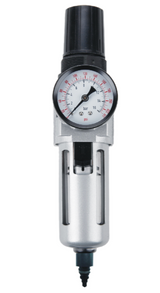Assessing the Health of Your Air Compressor Intake Filter
8 Ways to Know Whether Your Air Compressor Intake Filter is Still Good
Your air compressor is the unsung hero of your workspace, tirelessly generating compressed air for various applications. One critical component ensuring the longevity and efficiency of your compressor is the air filter. But how do you know if your air compressor filter is still up to the task? Let's explore some key indicators that will help you assess the health of your filter.
1. Visual Inspection:
- What to Look For: Examine the filter for visible dirt, dust, or debris accumulation.
- Signs of a Healthy Filter: A clean, light-colored filter indicates efficient air filtration.
- Red Flags: Dark and clogged filter elements are a clear sign that the filter needs attention.
2. Air Quality and Performance:
- How it Should Be: If your compressed air output maintains consistent quality and pressure, your filter is likely in good shape.
- What to Watch For: Reduced air pressure, fluctuating power, or a decline in tool performance can signal a struggling air filter.
3. Regular Inspection Schedule:
- Recommended Practice: Establish a routine inspection schedule based on your compressor usage.
- When to Inspect: Check your filter more frequently during periods of heavy use or in dusty environments.
4. Pressure Drop Analysis:
- Expected Behavior: Over time, it's normal for a compressor filter to experience a slight pressure drop.
- Concerning Signs: A sudden or significant increase in pressure drop may indicate a clogged or inefficient filter.
5. Manufacturer's Guidelines:
- Consult the Manual: Refer to your compressor's manual for recommended filter maintenance intervals.
- Follow Guidelines: Adhering to manufacturer guidelines ensures optimal performance and longevity.
6. Air Quality Testing:
- Conduct Air Quality Tests: Periodically test the air quality using a particle counter or air quality monitor.
- Acceptable Levels: If the air quality meets your application requirements, your filter is likely still effective.
7. Odor and Contamination Checks:
- Unusual Smells: If you detect an unusual odor in the compressed air, it may indicate contamination.
- What It Could Mean: Contaminants may pass through a compromised filter, signaling the need for a replacement.
8. Regular Filter Replacements:
- Routine Maintenance: Consider replacing your air compressor filter as part of your routine maintenance plan.
- Preventive Measure: Regular replacements prevent excessive strain on your compressor and maintain optimal efficiency.
Your air compressor filter plays a vital role in safeguarding both the compressor and the quality of your compressed air. By incorporating these assessments into your maintenance routine, you can ensure that your filter continues to deliver clean, efficient, and reliable compressed air. Remember, a little proactive care goes a long way in extending the life of your compressor and preserving air quality in your workspace.
Need a new filter? Master Tool Repair has a wide selection of air filters for most air compressor makes and models.
Recent Posts
-
Why Dry Air is Non-Negotiable for Your Operations
In many industrial and commercial settings, compressed air is the lifeblood of operations. It powers …Jul 8, 2025 -
The Sound of Trouble: Diagnosing Strange Noises in Your Air Compressor
Your air compressor is a workhorse, a reliable partner for countless tasks. But what happens when th …Jul 2, 2025 -
Mastering Your Compressor: How to Set the Perfect Pressure for Any Job
One of the most frequent questions we hear at Master Tool Repair is: "What pressure should my air co …Jun 6, 2025




